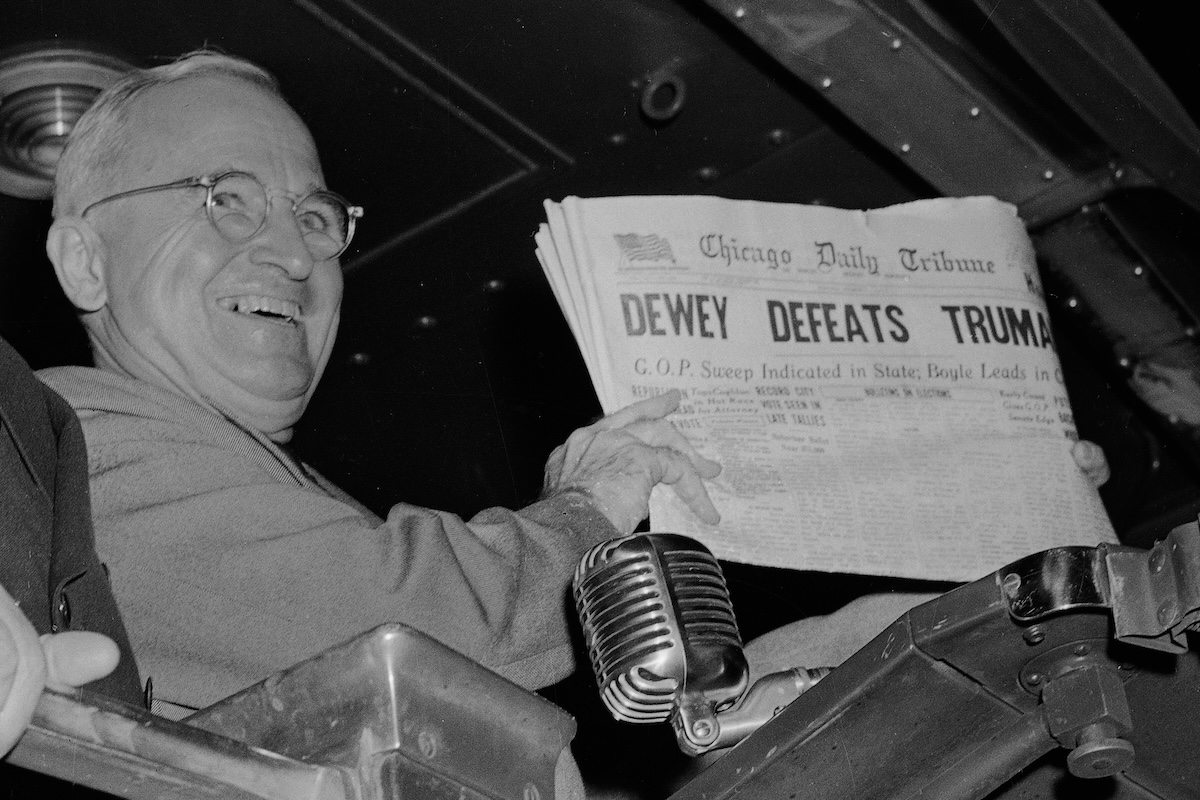It happens in many careers. A person with a “Do not steal” moral standard enters an organization where, it seems, everyone steals. What then?
Most of us have heard of Harry S. Truman, the 33rd president of the United States, but few people today know that Truman figured out a way to survive mostly unscathed in such an environment. Had he not, people outside western Missouri would never have heard of him, historians in C-SPAN polls would not place him in the presidential Top 10 for “moral authority,” and I wouldn’t be eating a slice of cake on May 8 to celebrate Truman’s 140th birthday.
Truman, born in 1884, never went to college. He worked in low-paying jobs as a construction company timekeeper and a bank and newspaper mailroom clerk. He ached with ambition but, with no clear path to satisfy it, wrote despondently at age 29 to his fiancée, Bess: “How does it feel being engaged to a clodhopper who has ambitions to be Governor of Montana and Chief Executive of the U.S. He’ll do well if he gets to be a retired farmer.”
Then came what we call World War I, which Americans then hoped was the War to End All Wars. Truman moved up in the army and became an artillery captain in France, promising Bess not to look at French mademoiselles and return “reasonably pure.” After the war, Truman failed as a haberdasher, but a friend, Jim Pendergast, was a member of western Missouri’s powerhouse Democratic family, skilled in ballot box theft and repeat voting: residents dressed up in different costumes and voted four or five times at various polling stations.
The Pendergasts proposed that Truman run for county “judge,” the equivalent of county commissioner elsewhere. Truman won a two-year term and then spent eight more years as presiding judge: a governmental CEO with 700 employees, a $7 million budget (equivalent to $120 million today), and the power to decide which companies would receive construction and repair contracts. Was there a way to advance in a world of corruption and remain “reasonably pure”?
On May 8, 1928, Truman’s 44th birthday, county voters approved a bond issue for new roads and a new hospital. Pendergast companies—Ready-Mixed Concrete, Midwest Paving, Kansas City Concrete Pipe, Public Service Pulverizing Company, and many others—expected to benefit. That’s when Truman had the most ethically crucial meeting of his life. Later came meetings with Winston Churchill and Joseph Stalin, but those and others wouldn’t have happened had his meeting with “The Boss,” Tom Pendergast, gone differently.
A furious Pendergast, with three upset road contractors sitting in, lambasted Truman: “These boys tell me you won’t give them contracts.” Truman replied, “They can get them if they are low bidders, but they won’t get paid for them unless they can come up to specifications.” Pendergast slowly cooled down, realized he had someone who could be unconventionally helpful, and finally told his cronies, “Didn’t I tell you boys—he’s the contrariest cuss in Missouri.”
After that, Pendergast never again pressured Truman to award contracts for obviously inferior work at high cost. When investigators accused him of corruption for which he eventually went to prison, Pendergast asserted halo-by-association, pointing to Truman’s honesty. Notice, though, what Truman said: low bidders who meet specifications, not necessarily the lowest bidders with the highest quality. Ties could go to the favored, but taxpayers would not pay more than they expected.
When it came time to build a new county courthouse, Truman traveled in his own car, at his own expense, to see courthouses from Brooklyn to Denver; he wanted a really good one, and apparently got it. Since it was Jackson County, Truman wanted a statue of Andrew Jackson in front of the courthouse. He stopped at Jackson’s home in Nashville, the Hermitage, to measure Jackson’s clothing. He wanted a statue of exactly Jackson’s height. Truman was generally frugal with his own dollars—he saved string—and the public’s.
That distinguished him from his two fellow judges/county commissioners, Robert Barr and Howard Vrooman, both of whom were for sale. Barr particularly disappointed Truman because he was a West Point graduate but turned out to be “a dud, a weakling, no ideals, no nothing. He’d use his office for his own enrichment, he’s not true to his wife (and a man not honorable in his marital relations is not usually honorable in any other).”
Truman vented further in agonized notes he made in 1933 while staying at the Pickwick Hotel at Tenth and McGee Streets in Kansas City: “I had to compromise in order to get the voted road system carried out. … I had to let a former saloonkeeper and murderer, a friend of the Boss’s, steal about $10,000 [to] keep the crooks from getting a million or more. … Was I right or did I compound a felony? I don’t know. … Anyway I’ve got the $6,500,000 worth of roads on the ground and at a figure that makes the crooks tear their hair.”
Truman continued his self-appraisal: “Am I just a crook to compromise in order to get the job done? … I wonder if I did the right thing to put a lot of no-account sons of bitches on the payroll … in order to satisfy the political powers and save $3,500,000. I believe I did do right. Anyway, I’m not a partner of any of them and I’ll go out poor.” That proved true in the short run: once Truman gave up his chance to pocket $1.5 million, he examined his bank account and saw that “I haven’t $150.”
In 1934, Truman, turning 50, won a seat in the U.S. Senate in an election that featured more than the usual fraud. The Pendergast machine brought in tough guys to intimidate voters. Four voters died from gunshots as police stood by, and Governor Guy Park rejected pleas to call out the Missouri National Guard. In 1936, tens of thousands of “ghost” voters brought victory for Pendergast candidates, one of whom piled up in a small ward 19,201 votes against 13 for his opponent. (Pendergast, ill before the election, said precinct captains “got carried away and voted the sick, the dying and the dead.”)
Truman called one Pendergast ally “a thug and a crook” and another a thief who had stolen half a million dollars—but Truman came through on the most important item for Pendergast, giving him control of all New Deal jobs and projects in Missouri. Judge Albert Reeves called Truman “a man who had been nominated by ghost votes, who had been elected with ghost votes.” Truman, though, could accurately say regarding Pendergast, “I don’t follow his advice on legislation. I vote the way I believe Missourians as a whole would want me to vote.”
In 1937 and 1938, when 200 Pendergast pawns went to jail for interfering with voting rights, Truman was untarred. When Pendergast gambled on horses, lost hundreds of thousands of dollars, and went to prison for not paying $552,000 in taxes, Truman was again “reasonably pure.” In 1941 he proposed a special committee to examine the awarding of defense contracts, and then became its chairman. In 70 hearings, he exposed boondoggles galore, such as a Texas military camp that exceeded its budget by 400%. After each investigation, public reports led to correction or renegotiation.
Suddenly, journalists became publicists. Influential columnist Marquis Childs in November 1942 called Truman “one of the most forthright and fearless of the 96 senators.” Arthur Krock of the New York Times praised Truman’s “objectivity at the total expense of partisanship.” In January 1943, a new tanker built with defective steel broke in half in Portland, Oregon. Two months later, “Investigator Truman” was on the cover of Time as the “energetic generalissimo” of a “Billion Dollar Watchdog.”
In 1944, the big city Democratic bosses who backed wealthy Franklin Delano Roosevelt for a fourth term gave nods to Harry S. Truman, a poor man without even a middle name, just an initial. Truman became known as “the man from Independence” (after his Missouri hometown) rather than, as initially styled by reporters, a dependent sell-out. Journalists and political patrons learned, as did voters, that Truman knew how to walk the tightrope of public service in a democracy.

